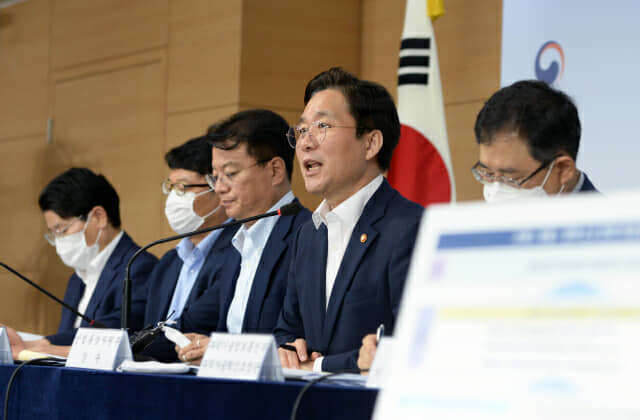
The government will invest 2.5 trillion won at the level of ministries in order to strengthen competitiveness, such as R&D, for the new year’s general manager.
The Ministry of Trade, Industry and Energy established’Special Accounting for Small Managers’ this year and invested KRW 2.745 trillion. In the new year, 23% from this year according to the’small manager 2.0 strategy’ to preemptively respond to the reorganization of the global supply chain (GVC). It was announced on the 27th that it would invest an increase of 2.5541 billion won.
It will invest KRW 1.755.9 trillion in R&D, KRW 436.8 billion in building infrastructure such as a demonstration test bed, and KRW 381.4 billion in financial support.
In the departmental-level small manager R&D, 68% of the total, or KRW 1.7 trillion, will be invested centering on the 158+α core items suggested in the’Ministry Manager 2.0 Strategy’. In particular, the Ministry of Industry is investing 1.3 trillion won, an increase of about 250 billion won from this year, in R&D for the new year’s general manager. The Ministry of Science and Technology and Information and Communication has secured a budget of 235.9 billion won and the Small and Medium Venture Business Ministry of 1953 billion won.
R&D investment is promoted in four directions: expanding investment in key strategic items and global expansion of the supply-demand business cooperation model in consideration of changes in the industrial environment such as GVC reorganization and low-carbon and eco-friendly demands.
■ Target and field
The value chain is analyzed in consideration of the necessity of production for the six business sectors and new industries, and materials and parts technology development business (878.6 billion won, 47%↑), machinery and equipment industry technology development business (133.2 billion won, 32.5%) Focus on R&D, focusing on ↑).

It will invest 650 billion won in technology development for 146 key strategic items related to materials, parts and equipment. Of this, about 300 billion won is invested in R&D of 60 new items. 158+α high-tech core strategic items according to the manager’s 2.0 strategy are promoted by the Ministry of Science and Technology and the Ministry of Science and Technology except for 146 items under the jurisdiction of the Ministry of Industry.
By sector, investment is adjusted in consideration of detailed project planning based on ▲ semiconductors and displays 32% ▲ electrical and electronic 17% ▲ mechanical metal 17% ▲ basic chemistry 15% ▲ automobile 10%.
370 billion won will be invested by converging industrial demand for new R&D in future new industries, support for leading small and medium-sized companies (30 billion won), cooperation model (35 billion won), and cooperative R&D between ministries (20 billion won).
■ R&D efficiency
By analyzing the value chain by industry such as key strategic items, identifying common types such as linkage and similarity between necessary tasks, and planning them in an integrated manner, it plans to increase efficiency such as preventing redundancy and increasing task size. For example, it is a method of integrated planning by developing high-functional nanocomposite materials that are commonly required for light weight, high durability, and fuel economy reduction in various industrial fields such as electric vehicles, process equipment, and aircraft.
Currently, 6 fields + new industries (α) are analyzed in connection with the demand of 2,233 candidate projects discovered through industrial demand surveys and detailed tasks are being planned. In early next year, the contest is scheduled to open after collecting opinions from industry and reviewing experts.
■ Expansion of cooperation model
In order to enter the overseas value chain and strengthen the supply chain, the cooperation model for demand-supply companies will be expanded to a global level such as overseas demand companies (research institutes).
It will expand to a’global open cooperation model’ to overseas companies (or research institutes) and invest a total of 35 billion won in more than 20 domestic and foreign cooperation models.

Candidate projects are identified through KOTRA and the Korea Institute for Industrial Technology Evaluation (KEIT), focusing on two linkage programs to enter the value chain of foreign companies in demand and strengthen technical cooperation for key strategic items with advanced research institutes such as Germany.
■ Strengthening the capabilities of future new industries
We will promote R&D of core materials and parts necessary to transform the existing material and parts industry into a future industry, such as the low carbon and eco-friendly trend.
In response to changes in future industry trends, the company plans to strengthen the response capabilities of existing subsidiary companies through R&D of core materials and parts such as new materials and parts, and induce business structure transformation. Currently, as a related expert, 70 candidates for future new industries are being reviewed, and R&D will be promoted through the selection of participating companies in stages starting this year.
The Ministry of Industry is scheduled to go through the process of collecting opinions from industry and the RFP verification process through the industrial technology R&D information portal at the beginning of next year. Following expert review and industry opinion collection, the company plans to promptly announce the R&D project and select and support participating companies in the first quarter.
Related Articles

‘Small Manager 2.0’ Core Base, Yongin Cluster Breakthrough?

The government announces’Ministry Manager 2.0 Strategy’… 5 trillion + α investment by 2022

The government releases an offensive’small manager 2.0 strategy’ this month

The government spurs’Ministry Manager 2.0′ in the new year… investing 2.5 trillion
An official from the Ministry of Industry said, “As the key to responding to the uncertainty, GVC reorganization, and transition to a low-carbon society due to Japan’s export regulations and Corona 19 is strengthening the industrial competitiveness of the general manager, the related policies are consistent and strong, focusing on the’small general manager 2.0 strategy.’ I will promote it.”
The Ministry of Industry is planning to cooperate closely with the public and private sectors to promote independence of core technologies essential for industrial production and preemptive securing of next-generation strategic technologies.
